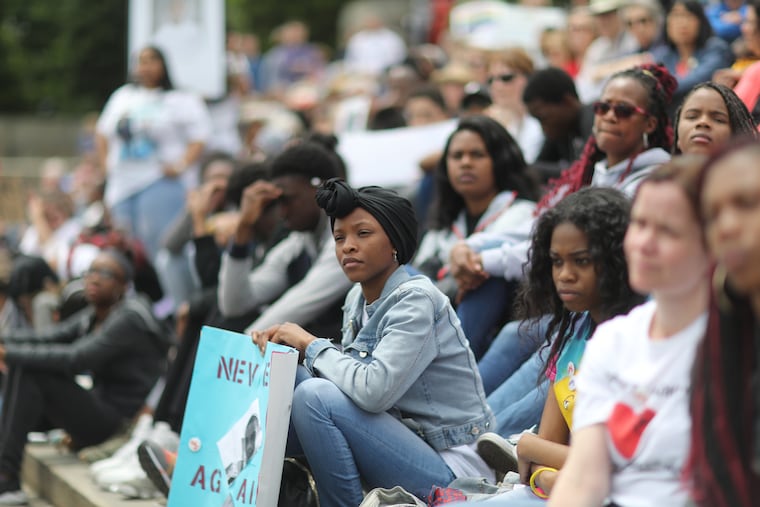You showed up, Philly! | Helen Ubiñas
Just a few feet from where tourists lined up to have their pictures taken with the Rocky statue, it was the survivors turn to be heard.

Philly, you showed up.
You showed up by the hundreds at the Art Museum steps Monday afternoon to stand against gun violence.
And why that mattered, why it mattered so much, was right there, etched on the faces of the Parkway Center City Middle College students.
These weren't the same kids that I met in March.
They stood taller, more confidently — you could see that in their eyes. And it had everything to do with stepping into the power of their own voices, a power these ninth graders were just starting to discover when I first met them.
Back then, they were struggling with whether they would participate in the national school walkout in support of the survivors of the Parkland school massacre. They struggled to understand why their daily experiences with gun violence never got the public's attention in the same way.
Why their lives didn't seem to matter as much.
But a lot had happened between the day they gathered inside their high school auditorium to read essays about all that and Monday afternoon, the third annual #FillTheSteps Against Gun Violence gathering.
They connected with Parkland students, thanks to ambassadors of the Love Button Global Movement, an organization that fosters acts of kindness — and that showed enormous kindness by coming to Philly for the day to support the students. They reveled in the camaraderie of marching alongside thousands of people their ages in Washington in support of tighter gun control. They spoke to people from all over the country at the Pulitzer Center about the violence that barely made headlines back home.
And now here they were, taking the lead before hundreds of people standing on the Art Museum steps to protest gun violence, hundreds of people who showed up in the middle of a weekday to listen, much like people had shown up for the Parkland students who harnessed their loss to push for change.
There, on the iconic steps, just a few feet from where tourists lined up to have their picture taken with the Rocky statue, it was their turn to be heard.
I held my breath as 15-year-old Kareema Chisolm walked to the microphone.
"Good afternoon, Philadelphia," she said, her voice wavering a bit. "I stand before you to represent all of the students of Philadelphia who must endure the gun violence that pervades this city. …"
Chisolm had not spoken before a crowd like this one. She was nervous, she later confided, until she had that feeling again, that people were listening to what she had to say, and that what she had to say really mattered.
"Things feel different," said her classmate Dena Hill. Hill recited a poem at the gathering.
"For all these people to actually come out to support not only us, but the mothers who lost their kids, it was amazing, empowering," Hill said. "I believe we understand that we have a place in all of this now."
This must be what parents feel like when they realize their kids are growing into their own.
In the last few months, as I watched the students become more comfortable in their own skin, more comfortable using their voices, I had been thinking that it was nearing the time to turn #FillTheSteps over to them. Time for them to lead, and us to follow.
But were they ready, I wondered, and would they want the responsibility of forcing people to not just acknowledge the gun violence in Philadelphia, but to join them to combat it?
"Of course," Hill said. "If we have real purpose, a real reason to keep fighting, then why would we stop?"
They just needed one thing, she said: support.
"The more numbers you have, the more likely it is that something can change," she said, sounding every bit the leader she already is. "Think about it. Politics is a numbers game – the person with the most numbers wins. So the more numbers we have behind us, the more likely we can change things."
"We are ready," she said. "We'll still need some help . . . but we are ready."
Staff writer Anya van Wagtendonk contributed to this column.